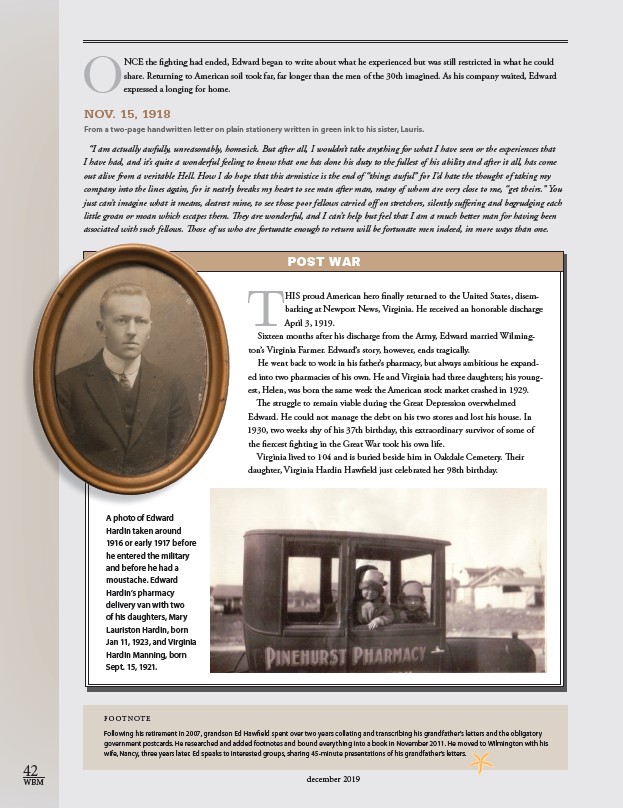
ONCE the fighting had ended, Edward began to write about what he experienced but was still restricted in what he could
share. Returning to American soil took far, far longer than the men of the 30th imagined. As his company waited, Edward
expressed a longing for home.
NOV. 15, 1918
From a two-page handwritten letter on plain stationery written in green ink to his sister, Lauris.
“I am actually awfully, unreasonably, homesick. But after all, I wouldn’t take anything for what I have seen or the experiences that
I have had, and it’s quite a wonderful feeling to know that one has done his duty to the fullest of his ability and after it all, has come
out alive from a veritable Hell. How I do hope that this armistice is the end of “things awful” for I’d hate the thought of taking my
company into the lines again, for it nearly breaks my heart to see man after man, many of whom are very close to me, “get theirs.” You
just can’t imagine what it means, dearest mine, to see those poor fellows carried off on stretchers, silently suffering and begrudging each
little groan or moan which escapes them. They are wonderful, and I can’t help but feel that I am a much better man for having been
associated with such fellows. Those of us who are fortunate enough to return will be fortunate men indeed, in more ways than one.
POST WAR
THIS proud American hero finally returned to the United States, disem-barking
at Newport News, Virginia. He received an honorable discharge
April 3, 1919.
Sixteen months after his discharge from the Army, Edward married Wilming-ton’s
Virginia Farmer. Edward’s story, however, ends tragically.
He went back to work in his father’s pharmacy, but always ambitious he expand-ed
into two pharmacies of his own. He and Virginia had three daughters; his young-est,
Helen, was born the same week the American stock market crashed in 1929.
The struggle to remain viable during the Great Depression overwhelmed
Edward. He could not manage the debt on his two stores and lost his house. In
1930, two weeks shy of his 37th birthday, this extraordinary survivor of some of
the fiercest fighting in the Great War took his own life.
Virginia lived to 104 and is buried beside him in Oakdale Cemetery. Their
daughter, Virginia Hardin Hawfield just celebrated her 98th birthday.
A photo of Edward
Hardin taken around
1916 or early 1917 before
he entered the military
and before he had a
moustache. Edward
Hardin’s pharmacy
delivery van with two
of his daughters, Mary
Lauriston Hardin, born
Jan 11, 1923, and Virginia
Hardin Manning, born
Sept. 15, 1921.
FOOTNOTE
Following his retirement in 2007, grandson Ed Hawfield spent over two years collating and transcribing his grandfather’s letters and the obligatory
government postcards. He researched and added footnotes and bound everything into a book in November 2011. He moved to Wilmington with his
wife, Nancy, three years later. Ed speaks to interested groups, sharing 45-minute presentations of his grandfather’s letters.
42
WBM december 2019